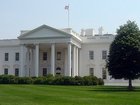Russia clashed once again with Western powers Tuesday as envoys drafted a U.N. resolution to add muscle to a plan to strip Syria of its chemical weapons.
U.S. President Barack Obama maintained his threat to launch military strikes against the regime of Syrian President Bashar Assad, even while cranking up the diplomatic pressure on Moscow.
 Full Story
Full Story
A Syrian caricature shows U.S. President Barack Obama smile and pluck the petals of a daisy, as he wonders, "Should I bomb? Or shouldn't I bomb?"
While delays a strike against President Bashar Assad's regime that was thought imminent a week ago, Syrians on both sides of their civil war are resorting to black humor, sharing jokes and cartoons via mobile phone and the Internet.
 Full Story
Full Story
U.S. President Barack Obama and his Russian counterpart Vladimir Putin discussed the idea of placing Syrian chemical weapons under international control at last week's G20 summit in Saint Petersburg, Putin's spokesman said Tuesday.
"The issue was discussed," spokesman Dmitry Peskov was quoted by Russian agencies as saying in response to the question of who initiated the proposal that Syria hand over its chemical arsenal in order to avert a U.S. strike.
 Full Story
Full Story
U.S. President Barack Obama has said that it was possible for Iran and Hizbullah to launch "asymmetrical strikes" in response to U.S. military action against the Syrian regime but dismissed them as nothing more than "the kinds of threats that we are dealing with around the world."
In interviews with six television stations on Monday, Obama said he would not take a recent threat by Syrian President Bashar Assad as credible.
 Full Story
Full Story
President Barack Obama conceded Monday night he might lose his fight for congressional support of a military strike against Syria, and declined to say what he would do if lawmakers reject his call to back retaliation for a chemical weapons attack last month.
The president sought to use a glimmer of a possible diplomatic solution — including vaguely encouraging statements by Russian and Syrian officials on Monday — as fresh reason for Congress to back his plan. Syria welcomed a proposal to turn over all of its chemical weapons to international control.
 Full Story
Full Story
The United States said Monday it would welcome a plan for Syria to hand over its chemical weapons but expressed skepticism at the Russian initiative, which is designed to head off American air strikes.
However, the U.S. Senate announced later on Monday that it will hold a procedural vote Wednesday on a measure authorizing President Barack Obama to use military force against Syria.
 Full Story
Full Story
Presidents Barack Obama and Bashar Assad will go head-to-head in dueling U.S. television interviews Monday, as a crucial week dawns for the U.S. leader's push for air attacks on Syria.
Assad will reportedly deny that he used chemical weapons on civilians, as Obama makes a long-odds push to reverse his nation's mood and win support for punishing the Damascus regime for flouting taboos on the use of such arms.
 Full Story
Full Story
Syrian President Bashar Assad has denied in an interview with CBS television that he was behind a chemical attack last month and called on lawmakers to reject planned U.S. military strikes, the U.S. network said Sunday.
"He denied that he had anything to do with the attack," CBS veteran correspondent Charlie Rose said, speaking after earlier interviewing Assad in Syria.
 Full Story
Full Story
The Obama administration is already planning "for every contingency" in case of any fallout from U.S. military strikes against the Syrian regime, a top White House official said Sunday, as a defense official said the U.S. could increase the scale of strikes as needed.
White House Chief of Staff Denis McDonough refused to be drawn on whether President Barack Obama would go ahead with any strikes if Congress refuses to give military action a green light, nor would he be drawn on any specifics.
 Full Story
Full Story
The Pentagon is readying more intense and longer attacks on Syria than originally planned, set to last three days, the Los Angeles Times reported Sunday.
War planners now aim to unleash a heavy barrage of missile strikes to be followed swiftly by additional attacks on targets that may have been missed or remain standing after the initial launch, the Times cited officials as saying.
 Full Story
Full Story



